Germany grapples with integration after opening its borders
BERLIN — Anas Maghrebi rolled his drumsticks back and forth between his thumb and forefinger.
The 27-year-old singer-songwriter fled Syria’s civil war and landed on the Greek island of Lesbos in September 2015, at the peak of Europe’s migrant crisis.
His post-rock band made its way north to Germany, handing out CDs and holding impromptu gigs along the way.
Maghrebi now enjoys his new life in Berlin, a diverse city that he described as the “mecca for artists” in Europe. And for the most part, he feels at home here.
But not everything is rosy for Maghrebi. More than 18 months after arriving, he is only now beginning to learn German.
“It’s not like I come here and all of a sudden I’m a free bird,” he explained.
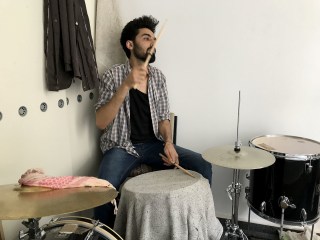
As for integration “it’s a really tricky term,” he mused, fidgeting with the tools of his trade. “I really don’t know if I even understand the term.”
Maghrebi’s arrival in Europe coincided with Chancellor Angela Merkel’s decision to open Germany’s borders to tens of thousands of exhausted asylum-seekers and migrants waiting at crossings from Hungary. Many were Syrians fleeing a conflict that has killed more than 400,000 and displaced millions.
“We can do this,” Merkel said at the time in an uncharacteristically decisive move that had repercussions in the federal election held in September.
Life in Germany remains a struggle for many of Maghrebi’s fellow recent arrivals. Around 1 million asylum-seekers reached the country — which had a population of 81 million — in 2015. At times more than 10,000 people were arriving daily.
But only around 16 percent of refugees are employed, according to official data published in September.
And while most of the asylum-seekers and refugees who spoke to NBC News said they felt their future lies in Germany, the majority admitted they did not yet feel a sense of belonging.
The issue of integration is a thorny one. Merkel’s government says the goal is neither multiculturalism nor assimilation.
“Integration is successful if immigrants are equal members of our society and can participate equally in social, cultural and political life,” a spokesman for Germany’s interior ministry said.
Maghrebi says he feels lucky. With his four-member band Khebez Dawle — which means “Government Bread” in Arabic — on hiatus, he is working on his first solo album.
And thanks to an anonymous donor, he recently received a scholarship to study at Bard College Berlin, a liberal arts school.
But it’s also clear that Maghrebi has still not entirely escaped Syria.
His lyrics are filled with existential questions and deal with the experience of being away from home but also — more universally — of “being an outsider in the world itself.”
“She proudly displays her fur as feathers, yet her face is smothered with alienation,” reads the English translation of a line from one new song in Arabic.
‘Rules of German life’
Ahmed Abdelkhader and his family are trying to get by in Hassloch, a town of 21,000 some 350 miles southwest of Berlin that is considered so broadly representative of Germany’s population that the consumer research industry tries out new products there.
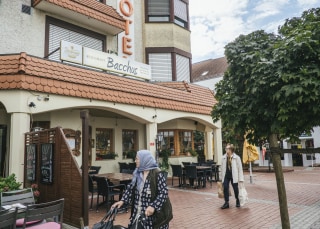
Abdelkhader, a Kurdish barber, arrived in Germany from Syria with his wife and six daughters in the fall of 2015.
His children were all 10 or younger when they made the treacherous journey across the Mediterranean Sea. The youngest, Alfa, was just 8 months old. After spending three months in a shelter, the family was relocated to Hassloch.
After more than 18 months in the town, Abdelkhader still speaks very little German, and his search for work has proved difficult.
Abdelkhader, 37, has little formal education and relies on the help of fellow Syrian Ghivara Mohamad to translate from Arabic to German.
“It’s hard to teach him German when he asks, ‘What does a verb mean?’” said Mohamad, trying to explain the challenges his friend faces.
Abdelkhader’s daughters seem to be faring better. The eldest, Amal, now 12, attends school and speaks passable German — though she says she doesn’t have many friends.
While Amal’s parents are happy she is attending classes, they find the emphasis on sexual education disturbing and say it jars with their Muslim faith.
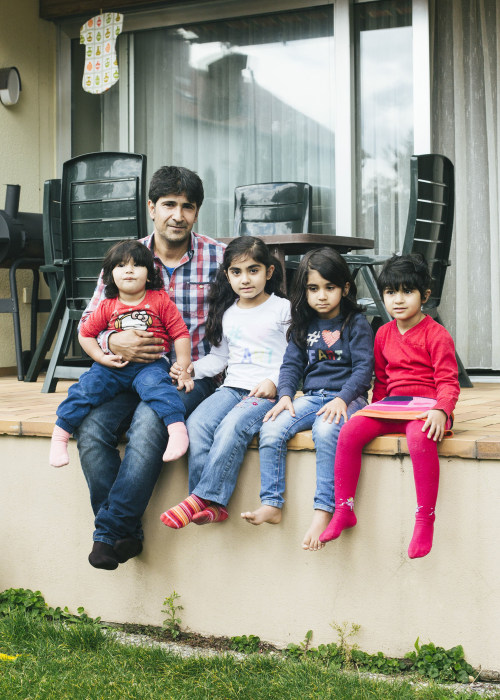
Some 150 refugees and 32 asylum-seekers live in the town, according to officials. That number has fluctuated over the past two years, with as many as 260 asylum-seekers calling it home at one point.
“The fact that you don’t really feel refugees in the village shows that integration is working,” said Ralf Trösch, the local official in charge of social affairs.
But it hasn’t all been easy. A homeless man was killed by an asylum-seeker, and there have been allegations of drug abuse, officials said.
Today’s challenges are more mundane. Trösch said one difficulty newcomers faced was neighbors’ complaints that they’re too loud after 10 p.m. Others included explaining the importance Germans place on punctuality and recycling.
“We’re now trying to teach refugees some rules of German life to limit problems,” Trösch said.
Many residents of Hassloch said they were proud of Merkel’s decision to take in refugees, but others said they knew people who were resentful.
A single asylum-seeker who no longer lives in a shelter officially receives 354 euros ($416) a month from the government, while a person formally given refugee status gets 409 euros ($480), according to local officials.
But Trösch cautioned that once you have accounted for rent, health insurance and administrative costs, the figure was more like 1,000 euros ($1,175).
“There is antipathy among some people. I listen to it everyday,” said Harald Sauer, who runs a bar off the town’s market square. “They see refugees walking past with Nike shoes and complain that they’re getting free money from the state.”

The far-right and anti-immigration Alternative for Germany (AfD) party, harnessing hostility toward foreigners, surged to third place in September’s federal election, winning 13 percent of the vote. The World Jewish Congress has called the AfD “a disgraceful reactionary movement which recalls the worst of Germany’s past.”
AfD campaign posters played heavily on the influx of refugees and migrants.
“Burqas?” read one poster picturing German girls frolicking on the beach. “We prefer bikinis.”
Another showed a picture of a pregnant woman. “New Germans? We will make them ourselves,” it read.
The party has also capitalized on incidents of violence involving newcomers, like one in Cologne on New Year’s Eve 2015 in which gangs of mostly foreign men sexually assaulted women out celebrating. Some of the men were asylum-seekers.
Islamist terror — such as a deadly truck attack last December by a Tunisian national who targeted a Christmas market in Berlin — has also provided fodder to far-right nationalists.
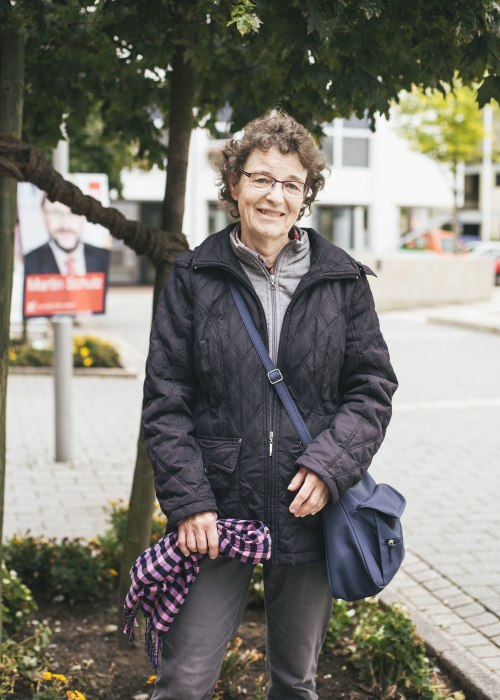
While Merkel won her fourth term as chancellor in September, the AfD’s showing has prompted critics to argue that her so-called willkommenskultur — or welcome culture toward refugees — had inadvertently reopened the door to the far-right in Germany.
Some residents in Hassloch, however, have taken it upon themselves to shepherd refugees through the integration process.
Elisabeth Heine, 66, a retiree who had bumped into Abdelkhader in the market square and asked about the progress of his job search, said that she and her husband had somewhat adopted his family.
“The children call us ‘Grandma’ and ‘Grandpa,’” she said.
Heine said Germans can’t expect refugees to immediately understand the intricacies of German life. “We help him navigate all the bureaucracy,” she said of Abdelkhader.
Reunited
Feras Rashid is all too familiar with the frustrations of German bureaucracy.
A 25-year-old Syrian Kurd, Rashid said he was forced to sleep on the floor of a Munich registration center for three days after arriving in August 2015. An economics graduate, Rashid had left his wife behind in Syria, and he was moved through several camps before landing in one outside the industrial town of Kassel.
“The first year was so difficult because I didn’t have anything to do other than waiting for asylum,” Rashid said. “I was always thinking about my wife, about family, about the situation in Aleppo.”
Rashid said the camps were generally comfortable and the staff polite, but not always. He recalled that on one occasion, having asked for a pillow, he was quickly rebuffed. “They told me that the only pillow I could have was my ass,” he said.
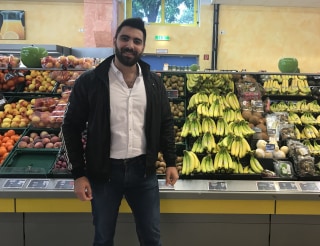
Now living with his pregnant wife, Nazly, who joined him in Germany last November, Rashid works part time in a supermarket while studying for his master’s degree.
Marco Wenzel, the store’s owner, said he was pleased with Rashid’s work.
“It’s about qualifications, not background,” said Wenzel, explaining that he never would have hired Rashid simply because he was a refugee. “To me he is a Syrian student, not a refugee.”
Rashid said he now has friends and feels at home in Germany — though he still marvels at the variety of vegetables and bread.
In August, he published an open letter in the German newspaper Bild appealing to refugees to “be thankful and behave.”
“We have to show them that we’re good people, that we will integrate with you and that we will be one society,” Rashid said.
‘We have kind German friends’
Afghan teen Narges Tavakkoli stood stretching with a group of other asylum-seekers before a three-mile run around the open expanse of Berlin’s former Tempelhof Airport.
A sea of Germans wearing fluorescent sports gear chatted outside the Nazi-built facility, which closed about a decade ago.
Once used to house prisoners of war, the site became one of the country’s largest emergency shelters for new arrivals in the fall of 2015.
At its peak, some 2,700 asylum-seekers lived there. Now there are 170 residents remaining, most of them refugees.
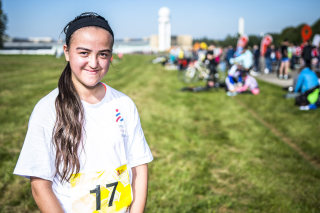
The dormitories inside the hangars are about to close and those still living there are set to move to new temporary housing on the former airfield.
Narges readied herself. “Drei, zwei, eins …” called the starter, and she was off. Whoosh.
Narges, 16, is training to be a sports instructor, but she says she really wants to be an astronaut.
She is part of a program for asylum-seekers that aims to help them meet Germans, establish a foothold in the community and make a small amount of money on the side.
Narges said she was generally happy in Berlin and was particularly pleased that girls and boys had equal rights in Germany. In Afghanistan, she “did not do sports — here I do lots of sport. I’m proud of myself.”
But she said life in the Tempelhof camp was difficult.
On the day NBC News met her parents, they were moving from the shelter to one farther out of the city.
“Life is very difficult for us here,” said Narges’ mother, Zeinab, adding that the situation was not suitable for a family of six. “There’s no door on the room, we have no privacy, and now that the cold is coming, mice and birds are coming into the hangars.”
Back in the Afghan city of Herat, the family owned a carpet factory that was helped by the U.S. Agency for International Development (USAID).
But the American assistance caused the Taliban to start asking questions, said Narges’ father, Hashim Tavakkoli. The family was forced to leave after the Taliban accused them of colluding with the U.S.
“They said they would kill me because they thought I was helping the Americans,” the 36-year-old father of four said.
The family left everything behind. Hashim now volunteers as a mechanic every morning in an effort to meet Germans and simply to have something to do, he said.
But it is clear his mind is restless.
“Wherever I walk in Berlin I measure how much time, how much work it would take to carpet the street,” he said, using his hands to simulate measuring. “I work as a mechanic, but really I’m a carpet maker.”
His wife said they were lucky to be in Germany. “My children are in school, they are learning,” Zeinab said. “We have kind German friends.”
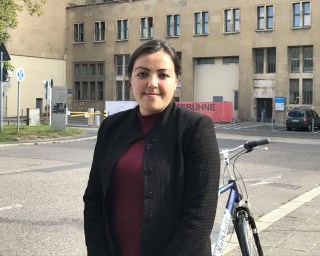
As she spoke, a German couple arrived in a van to help the family move to their new home.
Now what worries Zeinab the most is not being able to stay. The family has already been rejected from Norway, fleeing to Germany days before they were due to be deported.
Their situation here is no less precarious. In recent months, Merkel has targeted Afghans for deportation to discourage migrants from making the dangerous journey, and in an effort to be seen as clamping down on immigration.
The family has been waiting more than six months to hear if their asylum request will be granted.
“I don’t want to have to tell my children they can’t stay again,” Zeinab said.
A high-wire act
Merkel finds herself walking a tightrope on immigration.
On one side sit the Bahnhofsklatscher — or station clappers — who welcomed asylum-seekers and migrants as they arrived in train stations across the country in the fall of 2015 and who have since rallied to help them get back on their feet.
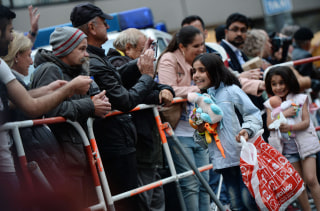
On the other side stand the Wutbürger, or angry citizens, who are concerned that the sheer numbers of newcomers will have a negative impact on their daily lives.
Pressure from them — and the AfD’s strong showing at the ballot box — has forced Merkel to concede groundto the more right-wing factions of her conservative alliance.
Last month, her party agreed that Germany would not let in more than 200,000 people a year on humanitarian grounds in an effort to unify her conservative bloc ahead of negotiations to form a new coalition government.
Last week, those coalition talks broke down over policy disagreements on migration controls and the environment.
But as Germany considers how many more refugees the world’s fourth-biggest economy can handle, it is also confronting how it treats those already here.
So is integration happening? Maghrebi, the Syrian musician, isn’t certain.
“Everyone says ‘integration,’ but everyone has their subjective meaning for the word,” he said.
Source: https://www.nbcnews.com/news/world/germany-grapples-integration-after-its-opening-borders-n810361